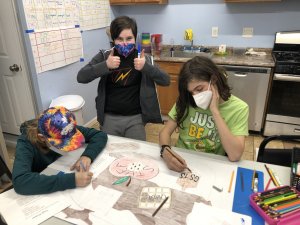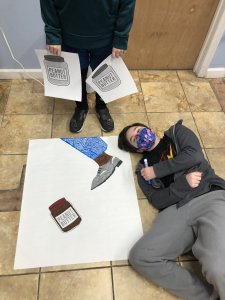
It’s crafting time in BMitzvah! We are focused on designing and preparing for making our own tallitot in the coming weeks. Everyone has come up with their own really unique, true to themselves ideas for what kind of tallit they want- from size to colors to themes to images. It is a joy to watch their creativity at work, and so fun to help each learner figure out how we can make their ideas a reality. This week we are doing all the prep work needed to be ready to design their fabric next week- making a pattern, drafting the imagery, and finalizing color choices and methods.
Their ideas range from:
- Star Wars theme with light sabers & rebel alliance symbol in the corners, gematria of “May The Force Be With You” on the atara
- Nerds (the candy!) theme with purple, orange, green and pink
- Quilt inspired by the Fibonacci sequence
- Stripes and Jewish stars
- Batiked design
Learners have also begun learning the trope for their aliyot this week. Many of our learners are feeling quite comfortable by now navigating the trope resources we have on their own, or confident asking a classmate for help- they have a packet that identifies each different trope with it’s Hebrew name, categorized by common phrases, and correlating recordings. In this way, learners are not just learning to memorize the trope for this aliyah, but building the skills of recognizing and identifying the melodies of the different trope, a lifelong skill they are starting now.
One day this week we had a really deep conversation about Birkhot Hashachar. One learner brought up the fact that the UN recently took a vote on whether or not access to food is a human right, and that every country but the US said yes, and connected this to the blessing in Birkot Hashachar where we thank God for giving us the skills and tools for everything we need. Which led her to ask, if we don’t have these things, like for example if we are in jail and not free, or are not able to see (some of the things the blessings thank God for) can we still say these blessings?
Here is some of the discussion we had around it:
- Maybe the people who don’t have these things don’t say this prayer and that’s why they don’t have them.
- I don’t think tefilah has a direct role in whether or not we have material things. [The whole class agreed with this idea.]
- The whole book [siddur] is praising God for giving us what we want- it’s like wishful thinking.
- You can still say it even if you don’t have those things.
- I would skip over them if I didn’t. It would make me feel bad to say it.
- You can thank God for something you don’t have.
- Would people who don’t have them then feel even more excluded if they’re skipping certain brachot?
- It’s not a blanket rule for each one. For example if you are blind you’re never going to see, but if you are in jail that could be a temporary thing that would change.
I am so looking forward to supporting these learners to bring their tallit designs into reality, and continuing to make space for their big and deep questions as the year continues.

